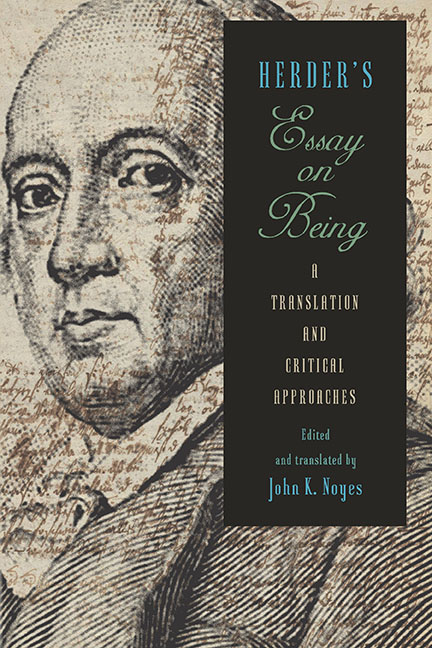Book contents
- Frontmatter
- Contents
- Acknowledgments
- List of Abbreviations
- Introduction: The Essay on Being
- Part I Versuch über das Seyn, by Johann Gottfried Herder
- Part II Critical Essays
- Herder's Essay on Being
- The Order of Being and the Order of Ideas: The Historical Context of Herder's Essay on Being
- Indivisible, Inexplicable, and the Center of All Certainty: Herder's Concept of Being
- The Metaphysical Foundation of Subjective Philosophy in Herder's Essay on Being
- Herder's Kantian Critique of Kant on the Concept of Being
- Attempting to Place the Essay on Being
- Herder's Early Neoplatonism
- Being, Possibility and God: A Comparison of Herder and Heidegger
- Bibliography
- Notes on the Contributors
- Index
Herder's Kantian Critique of Kant on the Concept of Being
from Part II - Critical Essays
Published online by Cambridge University Press: 13 April 2019
- Frontmatter
- Contents
- Acknowledgments
- List of Abbreviations
- Introduction: The Essay on Being
- Part I Versuch über das Seyn, by Johann Gottfried Herder
- Part II Critical Essays
- Herder's Essay on Being
- The Order of Being and the Order of Ideas: The Historical Context of Herder's Essay on Being
- Indivisible, Inexplicable, and the Center of All Certainty: Herder's Concept of Being
- The Metaphysical Foundation of Subjective Philosophy in Herder's Essay on Being
- Herder's Kantian Critique of Kant on the Concept of Being
- Attempting to Place the Essay on Being
- Herder's Early Neoplatonism
- Being, Possibility and God: A Comparison of Herder and Heidegger
- Bibliography
- Notes on the Contributors
- Index
Summary
HERDER's ORIGINALLY UNPUBLISHED Essay on Being (1763) was only made widely available in the twentieth century. It was the young Herder's first philosophical treatise, composed while he was attending the University of Königsberg (1762–64) and attending Kant's lectures on logic, mathematics, physical geography, moral philosophy, physics, and, most important here, metaphysics. Indeed, the Essay on Being engages with Kant's ideas on the proof of the existence of God as presented both in his metaphysics lectures, as evidenced by Herder's copious lecture notes, and in his 1762 treatise, Der einzig mögliche Beweisgrund (AA 2:63–163).
In the Essay on Being Herder steers a clear path with respect to what he collectively treats as logical arguments for the necessity of Being, or Sein, that he finds in Baumgarten, Wolff, and Kant, and presents an original conception not of the logical necessity, but rather of the sensory certainty, of Being. In the process Herder works out some core epistemological, and metaphysical, ideas that lay the groundwork for the philosophical anthropology that will orient his life's work. It is for this reason, and not simply because it is his very first philosophical treatise, that this work occupies such an important place in Herder's oeuvre. Although the writings that make up that oeuvre will range widely, far beyond “school philosophy” (Schulphilosophie) into studies of language, literature, culture, history, the conception of human nature that underlies them all was first worked out in the language of the particular philosophical tradition that he studied under Kant. More specifically, as I show in this chapter, the approach to epistemology that Herder develops both here, in his critique of Kant (my particular focus here), Wolff, and Baumgarten, and in several subsequent pieces from the 1760s, has its origin in ideas he learned from Kant himself. Herder's central thesis in his Essay on Being is that the concept of Being is not susceptible of objective, logical proof and is, rather, known only with a subjective, sensory certainty. The passion with which Herder expresses and defends this thesis reflects what appear to be deepseated convictions about human nature and human knowledge, yet the philosophical ideas that he employs in its defense are in fact not entirely original to him.
- Type
- Chapter
- Information
- Herder's Essay on BeingA Translation and Critical Approaches, pp. 134 - 150Publisher: Boydell & BrewerPrint publication year: 2018



